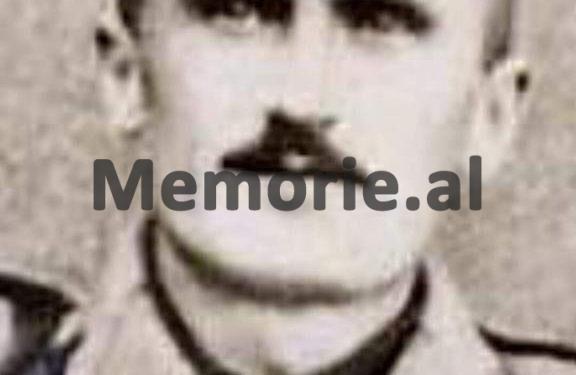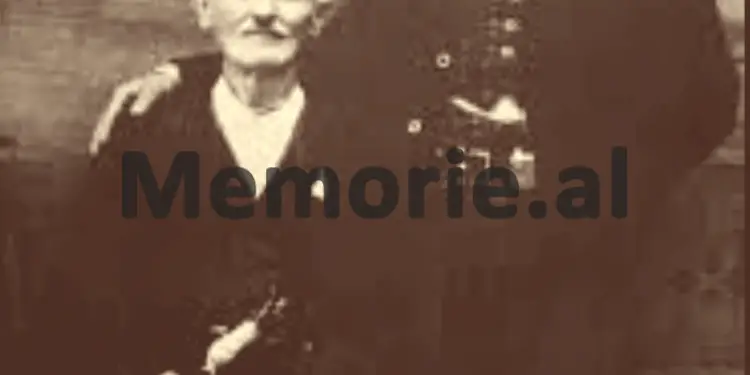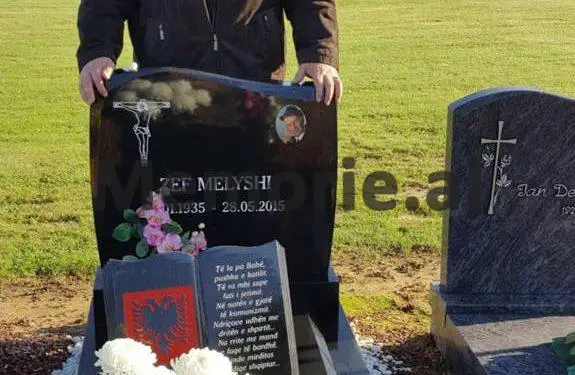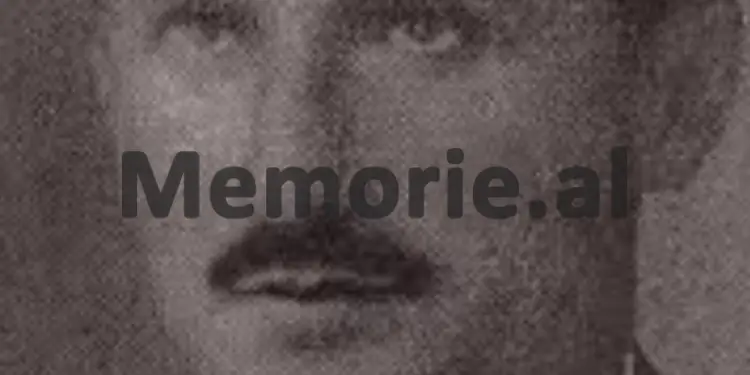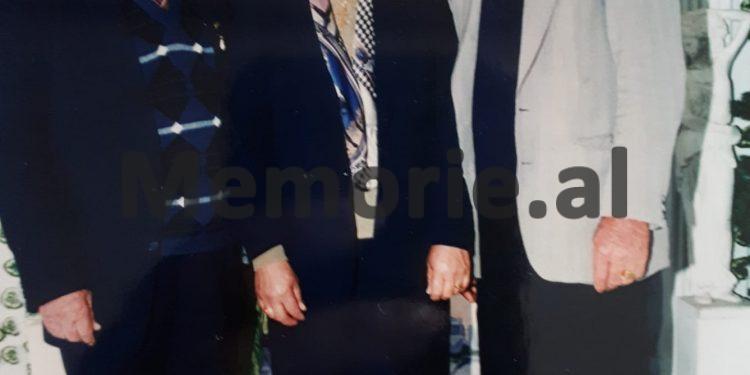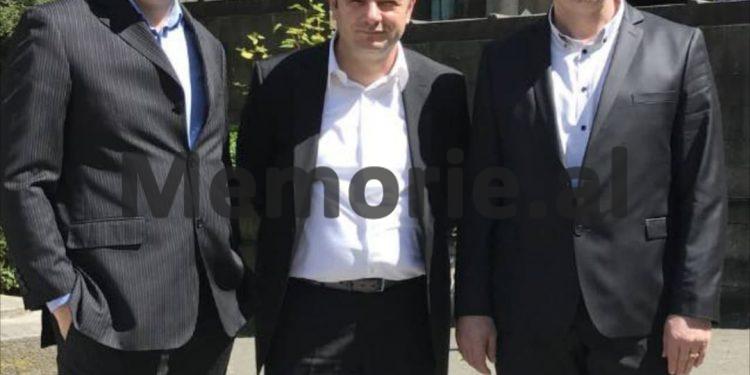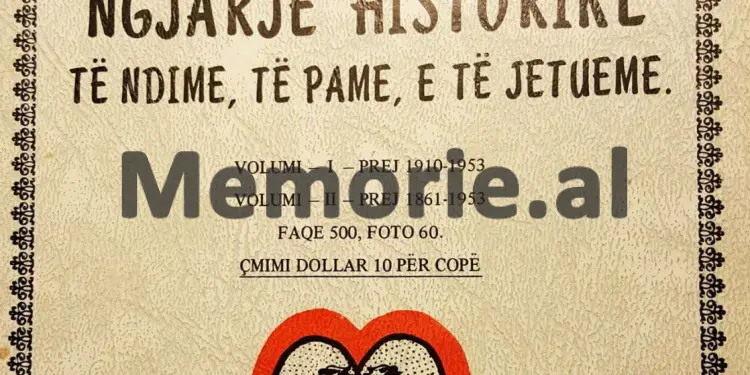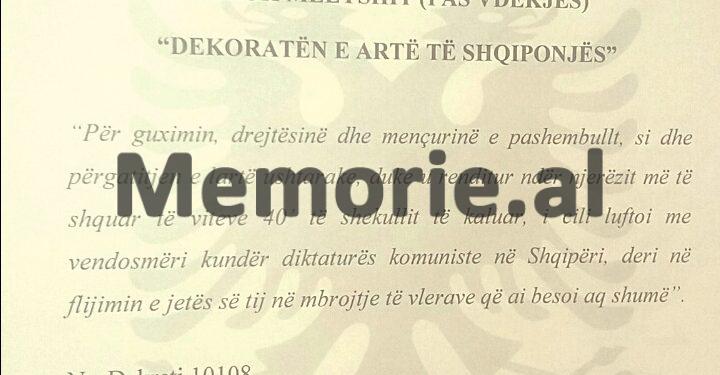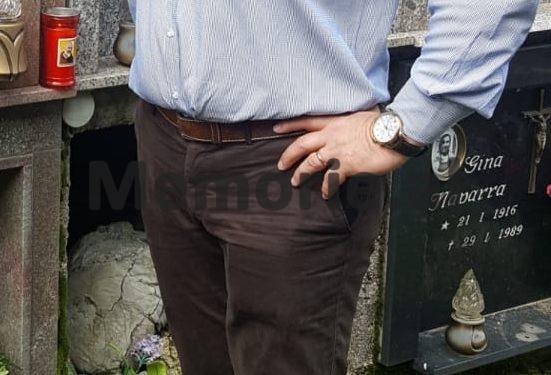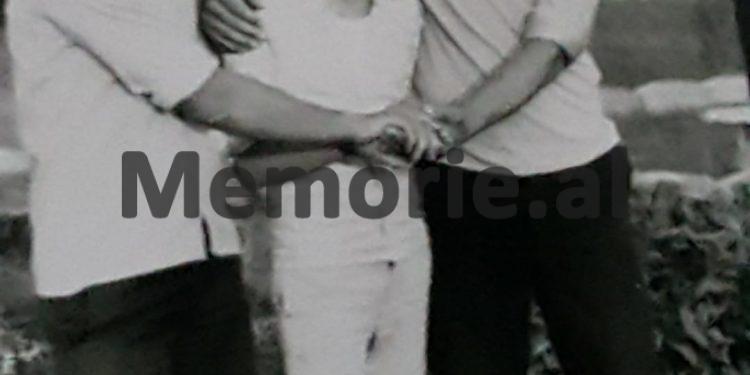Dashnor Kaloçi
Memorie.al/ “After this moment, as soon as Bardha left, in the presence of all the Mirditors of those villages who had been brought by force, the corpse of my grandfather, Frrok, was sprinkled with a kerosene canister and set on fire, terrorizing all present. It is said and there are still people who were present there, some lost their minds when they saw how the body of Frrok Mëlyshi was burned and how the body moved from the burning. When the fire was extinguished, one of the officers took the money out of his pocket and told one of them to go and buy a can of kerosene, after he had brought it, they set it on fire again. There are still alive men today in Mirdita who have seen that scene”! The man who speaks and testifies for the first time for Memorie.al, this event worthy only of horror movies, is 54-year-old Frrok Mëlyshi, originally from Serishta of Mirdita, who has lived in the city of Laç and since that he has been living and working in Brussels for two decades. Although for so many years away from Albania, Frroku has never stopped searching and collecting documents, photos, facts and evidence about the history of his family, one of the most famous in Mirdita, also because of the books that have been made for the tribe his and the movie “Fire Operation” where “Kreshnik Martini” played masterfully by the great Llazi Serbo, is a real character and the first cousin of Frroku’s father. But the story that Frrok Mëlyshi tells us exclusively for Memorie.al was related only to his family, his grandfather from where he inherited his name, as well as his father, Zef Mëlyshi, who at the age of 13, escaped from exile and traveled all night. the only way and no way in search of his father’s bones…?!
Mr. Mëlyshi, before we talk about the macabre event that happened with your grandfather, Frrok Mëlyshi, whose name you also inherit, can you briefly introduce us to the history of the Mëlyshi family?
My grandfather, Frrok Mëlyshi was born in Serishtë of Mirdita on August 10, 1908, he was the only son of Mark Mëlyshi, who also had two daughters, one married in Orosh and the other in the village of Shqalsh. When the grandfather was 8 years old, he was left an orphan because both his parents and his uncle died, Gjon Mëlyshi, who was also the first of our tribe and also the bayraktar of Kthella, raised him with a much greater care than the children. his. As Frroku was growing up prematurely, and seeing in him some special qualities, his uncle, John, was slowly giving up the direction of the bayrak, even though he was still very young. When he reached the age of compulsory military service, he was mobilized in the Royal Guard in Tirana, where he stood out for his high training, discipline and loyalty, which made King Zog personally rank him out of rank with the rank of togerit.
How long did Frrok Mëlyshi serve in the Royal Guard?
He served as long as the time of compulsory military service was, but although King Zog wanted to keep him there regularly, his uncle, Gjon Mëlyshi, refused, sending word to the King, that Frroku was an orphan and an only son. But as a sign of gratitude for the respect that the King was showing, he told him that he would give you another son and sent him, Nikoll Mëlyshi, Pal Mëlyshi’s father, the character now known from Mark Dodan’s books and the movie “Operation Fire”, Whose history the communist regime distorted, falsified and used for its own purpose and to divide the Mëlyshi tribe, who were all determined anti-communists. But this is a story in itself and I do not believe it is the place to address it here!?
We are focusing on your grandfather, Frrok Mëlyshi…
As I told you, Frroku was not allowed by his uncle, John, to stay in the Royal Guard and in his place, he sent Nikol Mëlyshi, who was educated and received the rank of first captain. While Frrok Mëlyshi returned to Mirditë where he took over the leadership of the bajrak, already more mature and manlier. This time coincided with the invasion of Albania by fascist Italy in April ’39 where Frroku was one of the Mirdita volunteers who managed to go to Durrës to fight alongside government forces under the command of Major Abaz Kupi. At that time in Durrës, there was also Nikoll Mëlyshi, with the rank of first captain, who in his book, “Events, we saw, we helped to live”, published in 1975 in the USA where he lived as political emigrant after 1944, has long described, not only his participation in that event, but also made an analysis as a military, how that resistance could and should be organized on April 7, 1939.
What activity did your grandfather, Frrok Mëlyshi, have during the occupation of the country, that is, 1939-1944?
In that period Frrok Mëlyshi continued as an active soldier in the Albanian National Army participating in the Italo-Greek War and like many other Albanian soldiers deserted from that war from the beginning. Later for two or three years he served in the district of Mat in the weapon of the Gendarmerie, and there he was highly respected as a former loyalist of King Zog.
What next?
He was then effective in the gendarmerie battalion commanded by Major Dod Nikolla, who in 1943 was sent by the government to establish order in the South of the country, where partisan forces had shot innocent people, especially in the Gjirokastra Region, mainly those of the National Front. In this context, Frroku took part in the fighting conducted by the battalion of Major Dod Nikolla in the village of Sinanaj of Tepelena, where he was killed by two boys from Puka, and Major Doda went into deep depression. After that event, Major Dod Nikolla lost his mind and they say that he was taken by the German forces to cure him and it is not known and his fate was never known.
But after those fights in the South of the country, what other activity did Frrok Mëlyshi have?
After that event, Frroku returned to Mirdirë and then went to the city of Shkodra where the “Shkodra Covenant” was created, led by the Captain of Mirdita, Gjon Markagjoni, where his son, Mark Gjon Marku, was in the post of Minister of Foreign Affairs. Interior. Frroku and Mark Gjon Marku had close blood ties from their mother. At that time, (around the end of November), in the city of Shkodra in front of the Great Cafe, the communists assassinated Major Ndrec Prenga (son of Preng Marka Prenga, mayor of Orosh), who was the District Commander of the Gendarmerie of Shkodra, and Lieutenant Colonel Adem Buletini (son of Isa Boletini), also a senior officer in that city. This event, or rather this murder that took place with treachery, irritated the Captain of Mirdita, Gjon Markagjon and his son, Mark, who sent words to the main communist leaders of Shkodra, to come and talk and show why had committed that murder. But they did not respond to the call of Captain John and so it was decided to take their revenge at all costs, dividing the duties of each of his loyalists and the areas where they would operate.
Yes, Frroku was appointed to take revenge on Major Ndreca and Lieutenant Colonel Boletini?
Frroku was one of the first and most loyal of Kapidan Gjoni and one of the only ones who performed the task in charge, which he reported to him at dinner when the meeting of the “Shkodra Covenant” took place at the Kapidan Gjoni Tower.
After that event, what happened to Frroku?
After that event, Frroku was forced to leave Shkodra, after the Communist Circle led by Vasil Shanto, sentenced him to death, issuing communiqués on the streets of the city of Shkodra. After leaving the city of Shkodra, he initially took refuge with his family, Cara in Vaun e Dejës and then continued his way to the highlands of Lezha, which borders Mirdita, staying with the Luli family. And from there to Mirdita, where he dealt with the organization of anti-communist resistance until the end of the War.
Why didn’t Frrok Mëlyshi leave Albania like Gjon Markagjoni, etc., since he knew that he had been sentenced to death since the time of the war?!
Grandpa Frroku had every opportunity to leave Albania, just as Kapidan Gjoni and many others left, but he did not want to leave because he had sworn and had a great hatred for the communists, who had assassinated some of them. from his closest friends. And based on this fact, he stayed in Albania and lived for five years in the mountains of Mirdita and the surrounding provinces. After the assassination of Mark Gjon Markut in the village of Prosek in Mirdita and then his brother, Lleshi, Frrok Mëlyshi for some time took command and led the “Mountain Committee”, in the anti-communist resistance in the district of Mirdita and beyond. But I wanted to emphasize that when Mark Gjonmarku was killed in Prosek, Frroku with 50 men who were under guns was in the village of Perlat, going to Marku’s loss, they were surrounded there and they were all being killed. But only Frrok’s intervention and ingenuity escaped him, who led that group of men out of the siege through the main road, where the communists had not laid ambushes, never thinking they would cross there. And after they came out of that siege, they entered the village of Shqalsh where they finally left the danger radius and there they were dispersed leaving certain meeting points and places, which continued until August 1948, when the event took place. with him in the village of Lajthizë i Fanit, on the border with the district of Kukës.
Specifically, what happened in Lajthiza?
In the village of Lajthizë, Frroku and those who accompanied him, all members of the anti-communist resistance and tried in several battles against the units of the Defense Division, stayed for three days waiting for Marka Jak Bajraktari, who was in Qafë Mali, near Fushë- Nuts. And when Mark got there, Frrok with the people he commanded, was surrounded on all four sides by communist forces, while Mark remained outside the siege, unable to meet them. But the moment Frrok’s guards heard noises from those around them and reported to him, he told them not to worry that it must have been Marka Jak Bajraktari, who was waiting for him. And at that moment when he was standing up, a bullet hit him in the ribs piercing his body.
What happened next to him…?
At that moment, he removed his body clothes and bandaged his wounds so that his blood would not drip and called on his comrades to disperse all at the highest speed.
Did his comrades follow what Frroku told them, so did they leave?
Yes, they would leave because they could not stay there anymore, as they would all be killed, but only a young boy from Lufi’s house approached Frroku, that our Mlyshëve house with them, were friends and enemies.
In what sense?
We had been friends with them, but then we had become enemies for various reasons, but that boy from Luf’s house stayed in Frrok’s group safer than with anyone else who had no enmity, as blood feuds were forbidden and who took the blood on the mountain, he was bleeding with the house of Gjonmark of Orosh of Mirdita. So even the mountain life where the anti-communist resistance groups were located, functioned according to the Kanun.
Going back to Frrok’s injury?
The boy approached him and was very angry, they say with tears in his eyes, he said: “Do you stay, Frrok…”?! And he asked her to stay with him until the end, but Frroku after giving him a bag where he kept the documents, gave him some porsi orally and ordered him to leave immediately from there.
Where should he take that briefcase?
According to the orders given by Frroku, that son of Lufi’s house had to take him to the village of Ndërfushas to Mark Gjonmarkut’s sister, who was married to Gjon Fushë, a well-known man not only in that area and in Mirditë, but also in Tirana. where he has also had his home since the time of the Bird Monarchy. And all the orders that Frroku gave that boy I followed exactly and that bag was found only after the ’90s, as they had hidden it because of the very important documents it had for anti-communist resistance groups.
Specifically, what was written there?
The bag was found degraded and the documents had become illegible, so it had no documentary value, as only the marks remained.
Going back to the incident with the injured Frroku, what happened to him after the escape of that boy?
Frroku stayed there for several hours, inserted into a century-old oak cavity, and with the weapons and ammunition he had, he fired from time to time in that direction from where the bullets had come. And in the end, when there were no more bullets, anticipating what would happen to him if he was caught alive by those around him, he killed himself by shooting himself in the head with a bullet. And so, they found the Forces of the Defense Division that had surrounded him.
What did they do to his body afterwards?
Immediately after they found him suicidal, an order was given for all the inhabitants of the villages of that area to gather in Shpal, which was the administrative center of Mirdita at that time, as they would take Frrok’s body there in order to terrorize the people.
But how did the people react in the villages where they stopped him?
The people certainly felt sorry, as Frrok Mëlyshi had a good name all over Mirdita, but the communists used an unprecedented ploy until then, as in every village where they took him, they gathered all the people and initially asked him: did anyone know him? And whoever said that he knew him, this is Frrok Mëlyshi, as happened in some villages, he was immediately caught, tied up and tortured, saying: “Where did you see Frrok Mëlyshi, how did you see him, and why? you did not denounce it “, etc.
Before we talk about what the communists did with Frrok’s body in Shpal i Mirdita, what happened to his comrades, did they get out of the siege?
They all came out of the siege and on the same day they traveled towards the state border with Yugoslavia, leaving for Kosovo and there they lost their traces forever. So even today there is no data on where Frrok Mëlyshi’s group ended up.
We return to the event in St. Paul, while the body of Frrok Mëlyshi arrived there, but did his family know what had happened?
When the news broke in the villages that everyone had to gather in St. Paul that they had killed Frrok Mëlyshi, his sister Bardha, who was married in Orosh, found out that she immediately left for St. Paul. When he got there and saw the body of his brothers half-naked, he approached her to fix those clothes as best he could and put on a new pair of woolen socks that he had taken with him.
They did not say anything to him, so they did not stop him…?
An officer approached her and asked who she was and what her body was. And when she told him that she was a sister, that officer added: “Well, when you are a sister, why did you not teach your brother not to end up like that”?
How did she respond?
Bardha told him: “This was not a man who listened to women.” The officer was offended by that answer and ordered that Bardha be removed from there, but she objected by telling them: do not touch me, because I will leave on my own. After this moment, as soon as Bardha left, in the presence of all the Mirditors of those villages who had been brought to him by force, they sprinkled Frrok’s body with a kerosene canister and set it on fire, terrorizing all those present.
How did the people react at that moment when they saw that scene?
It is said and there are living people who have been present there, that some lost their minds when they saw how the body of Frrok Mëlyshi was burned and how the body moved from the burning. When the fire was extinguished, one of the officers took the money out of his pocket and told someone there to go and buy a can of kerosene, after he brought it, they set it on fire again. There are still men alive today in Mirdita who have seen that scene!
What about his sister, Bardha was there at that moment?
No, she left because she foresaw that the communists would do something serious to her brother’s corpse, but she never thought they would burn her with stone oil.
But after this event, what happened to your grandfather’s family, did the communists take revenge?
Immediately after that the persecution began. Frroku’s wife, Gjela, (my grandmother) was first interned at the Rubik Church and later in Berat Castle and Tepelena, she was released when the camp closed. Gjela was with her four children, two sons: Zefi (my father), Gjergj, Dranen and Roza. While the other daughter, Dava, (who was the eldest of the children) was not exiled, as she was married in Laç (to Ndue Lika) and thus she was able to escape the suffering and horrors that her mother, the brothers of motrat.
How long did they stay at Rubik Church?
They stayed there for 8 months and my father, Zefi, who was only 13 years old at the time, just learned of the incident, that his father had been killed and his body had been burned, when the family finished the dinner appeal, without telling him the man, running away from home and walking all night, goes to St. Paul to look for his father’s grave. But before leaving, he had also talked to a police officer, who if he was late in the morning, he would justify not to agree.
Who was that cop?
Jak Lala, his name was and was from the Qypi tribe of the White Mountain of Kurbin, with whom our family was friends.
Did your father, Zefi, manage to learn the burial place of his father, Frrok?
Yes, as soon as he went to St. Paul, Dad knocked on a house he had heard from conversations in our family that they were our friends and asked for help. Although it was a great fear and which could have great consequences, they accepted and showed up ready to go out immediately taking a linen bag with them and went to the place where Frrok’s half-burnt corpse was buried.
And they found…?
They found them, as there was no deep grave, but simply a pit, where they had thrown the half-burnt body of Frrok and covered it with and not more than 10 cm. This is what my father told us and they discovered them with great difficulty, as they had neither a pickaxe nor a shovel with them. They were not taken for granted.
What did they do after finding the place where they had put it?
Dad told us that he had found almost the largest part of the bones, the main ones and the skull with the bullet hole. He put all of them in the linen bag, father Zefi from Shpali traveled to our village of origin, Serishte, which is not far away, where our burned houses were, after the exile they had done to Frrok’s family.
And what did he do there?
There he found a place in the corner of the tower, covering them with stone, with the thought that he would come another day the same night and take them to bury them. After that, he traveled all night and, in the morning, he was in Rubik where the appeal was made and he had no problem.
What happened to those bones next?
After 8 months, Frroku’s family, mother Gjela, Zefi and Gjergj, as well as their two daughters, Roza and Dranja, were interned first in the castle of Berat, then in Tepelena and this internment lasted 8 years. When they returned from exile, the father immediately went to the place where he had covered the bones, but found no sign, as the stones had also moved. Dad pointed out that the thing could have been done by wild animals, or even someone who had gone to get the stones, to make some corner of the wall, as they were carved.
Did the father worry about this story, the loss of his father’s bones?
Many, my father often mentioned this after the ’90s and he passed away with great worry. But before he died, he made a symbolic grave for his father, in the village of Malaj at the Church of St. Vlash, where on the plaque placed on his head, he wrote “Here rests his soul”. / Memorie.al




